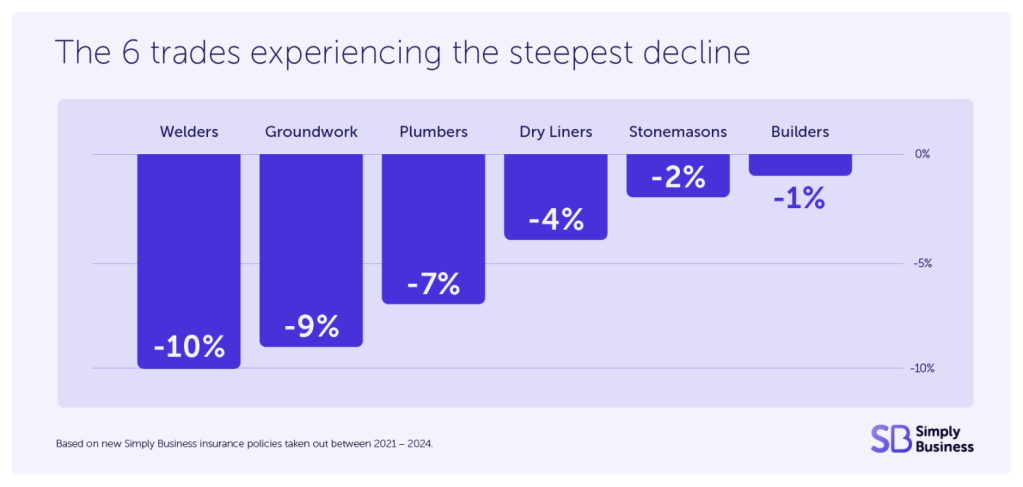Britain’s traditional trades are disappearing at an accelerating rate, according to new figures from Simply Business that reveal steep declines in key skilled professions over the past four years.
We looked at the number of tradespeople insured by Simply Business from 2021 to 2024 to understand how the industry is changing.

Sharp declines across core construction trades
Welders have seen the largest drop, with a 10 per cent decline in numbers, closely followed by groundwork (-9 per cent) and plumbing (-7 per cent). Even general builders – long seen as the backbone of the construction industry – are down by 1 per cent.
Could the figures point to a growing crisis in the UK’s construction and manufacturing workforce? An ageing population, limited vocational training, and post-pandemic economic pressures are combining to reduce the pipeline of skilled workers entering these trades.
Challenges for self-employed tradespeople include:
- Demographic shifts – a high proportion of experienced tradespeople are nearing retirement age
- Training bottlenecks – many small firms lack resources to take on apprentices
- Perception issues – young people are often steered away from vocational careers despite high earning potential
For small and medium-sized contractors, the shortage is already being felt. Many report difficulty recruiting skilled staff and pressure to raise wages to retain existing workers.
Read more: Which trade earns the most – and where?
Risks to growth and infrastructure
The skills gap threatens the delivery of key national infrastructure – from new housing developments to energy transition projects.
Welders and groundworkers are essential to large-scale renewable and transport schemes, while stonemasons and dry liners play crucial roles in restoration work.
Dan, a self-employed carpenter, thinks more should be done to encourage a career in the trades in schools.
He says: “My path into the trades came from knowing people in them rather than being educated about it. It’s a shame that it isn’t pushed more from a school perspective, as it’s a great career route.
“I believe one barrier to entry is that the low wages from apprenticeships can be seen as unappealing to young people who aren’t thinking about the long term. If there was more education about the long-term opportunities, I think more would be keen to make a career out of the trades.”

Policy in focus: Autumn Budget 2025
The upcoming Autumn Budget 2025 is expected to address workforce shortages, with measures aimed at supporting apprenticeships and trade education. Industry bodies are calling for:
- tax relief for small firms investing in apprenticeships
- regional funding for skills academies
- stronger promotion of vocational routes in schools
The government has signalled that workforce investment will be a central theme of the Budget, with construction, manufacturing, and green industries identified as priority sectors.
A race against time
From welders to stonemasons, the UK’s traditional trades could be at risk of fading away – taking with them a vital part of the nation’s industrial heritage. Small businesses are calling for decisive government action to revive training, attract new entrants, and secure the future of the skilled workforce.
As the Budget approaches, all eyes will be on whether the government can halt – or even reverse – the decline in Britain’s vanishing trades.
More on the state of trades
- What could the trades skills shortage look like in 2030?
- UK tool theft hotspots: where are your tools most at risk?
- What is the Construction Industry Scheme (CIS) and how does it work?
- Generation Entrepreneur Report 2025
Are you protecting your tools?
As one of the UK’s biggest business insurance providers, we know the importance of covering your tools. Why not take a look now and build a quick, tailored tool insurance quote?
